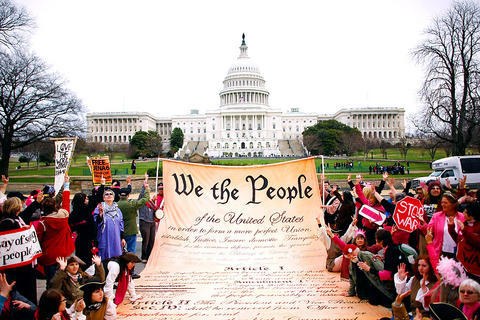Five years after launching the US invasion of Iraq, US President George W. Bush was making some of his most expansive claims of success in the fighting there. Bush said last year's troop buildup has turned Iraq around and produced "the first large-scale Arab uprising against Osama bin Laden."
At the Pentagon, Bush was to give a speech to warn that backsliding on recent progress fueled by the increase of 30,000 troops he ordered more than a year ago cannot be allowed.
"The challenge in the period ahead is to consolidate the gains we have made and seal the extremists' defeat," he said in speech excerpts the White House released on Tuesday night.

PHOTO: AFP
Democrats took a different view.
"On this grim milestone, it is worth remembering how we got into this situation and thinking about how best we can get out," congressman John Dingell said. "The tasks that remain in Iraq -- to bring an end to sectarian conflict, to devise a way to share political power and to create a functioning government that is capable of providing for the needs of the Iraqi people -- are tasks that only the Iraqis can complete."
Meanwhile, demonstrations and acts of civil disobedience were planned across the country to coincide with the anniversary.
Protests were planned in Washington, where demonstrators vowed to block the entrance to the Internal Revenue Service and to disrupt the offices of lobbyists who represent military contractors and oil companies profiting from the war.
College students from New Jersey to North Dakota planned walkouts, while students at the University of Minnesota vowed to shut down military recruiting offices on campus.
"This is the first time coordinated direct actions of civil disobedience are happening," said Barbra Bearden, of the group Peace Action.

WAITING GAME: The US has so far only offered a ‘best rate tariff,’ which officials assume is about 15 percent, the same as Japan, a person familiar with the matter said Taiwan and the US have completed “technical consultations” regarding tariffs and a finalized rate is expected to be released soon, Executive Yuan spokeswoman Michelle Lee (李慧芝) told a news conference yesterday, as a 90-day pause on US President Donald Trump’s “reciprocal” tariffs is set to expire today. The two countries have reached a “certain degree of consensus” on issues such as tariffs, nontariff trade barriers, trade facilitation, supply chain resilience and economic security, Lee said. They also discussed opportunities for cooperation, investment and procurement, she said. A joint statement is still being negotiated and would be released once the US government has made

Authorities have detained three former Taiwan Semiconductor Manufacturing Co (TMSC, 台積電) employees on suspicion of compromising classified technology used in making 2-nanometer chips, the Taiwan High Prosecutors’ Office said yesterday. Prosecutors are holding a former TSMC engineer surnamed Chen (陳) and two recently sacked TSMC engineers, including one person surnamed Wu (吳) in detention with restricted communication, following an investigation launched on July 25, a statement said. The announcement came a day after Nikkei Asia reported on the technology theft in an exclusive story, saying TSMC had fired two workers for contravening data rules on advanced chipmaking technology. Two-nanometer wafers are the most

NEW GEAR: On top of the new Tien Kung IV air defense missiles, the military is expected to place orders for a new combat vehicle next year for delivery in 2028 Mass production of Tien Kung IV (Sky Bow IV) missiles is expected to start next year, with plans to order 122 pods, the Ministry of National Defense’s (MND) latest list of regulated military material showed. The document said that the armed forces would obtain 46 pods of the air defense missiles next year and 76 pods the year after that. The Tien Kung IV is designed to intercept cruise missiles and ballistic missiles to an altitude of 70km, compared with the 60km maximum altitude achieved by the Missile Segment Enhancement variant of PAC-3 systems. A defense source said yesterday that the number of

Taiwanese exports to the US are to be subject to a 20 percent tariff starting on Thursday next week, according to an executive order signed by US President Donald Trump yesterday. The 20 percent levy was the same as the tariffs imposed on Vietnam, Sri Lanka and Bangladesh by Trump. It was higher than the tariffs imposed on Japan, South Korea and the EU (15 percent), as well as those on the Philippines (19 percent). A Taiwan official with knowledge of the matter said it is a "phased" tariff rate, and negotiations would continue. "Once negotiations conclude, Taiwan will obtain a better